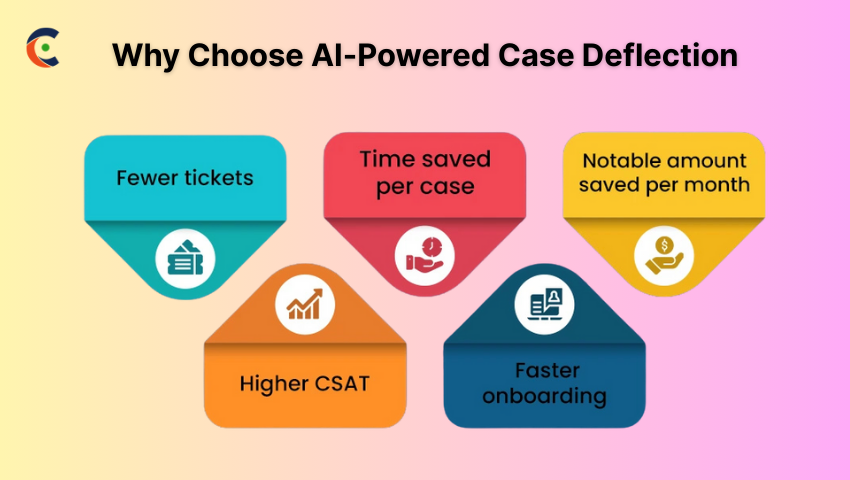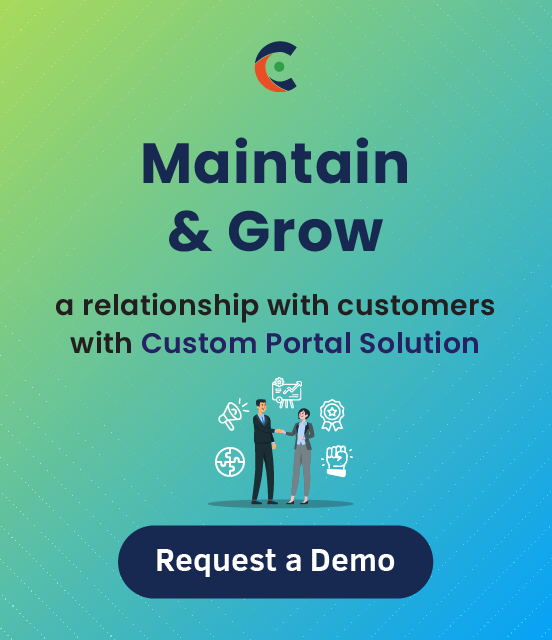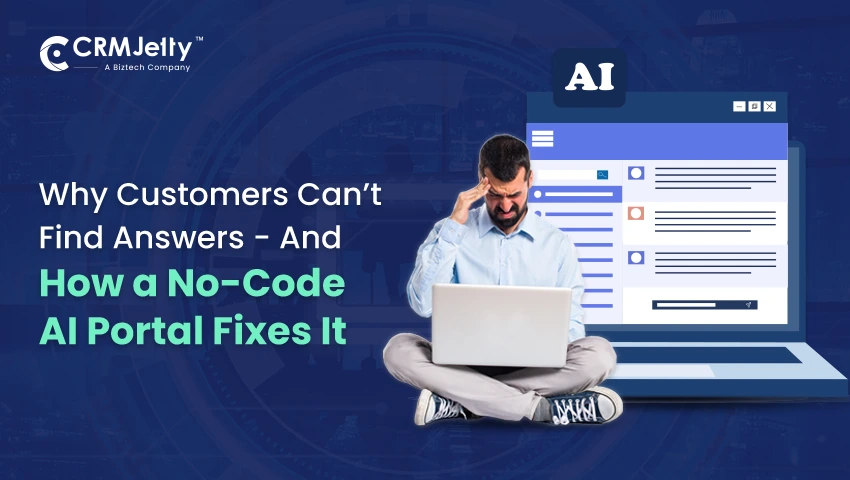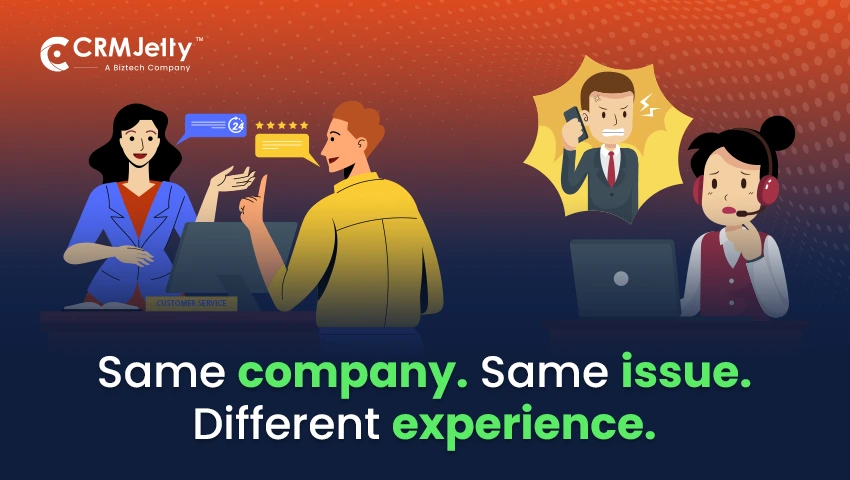Customer expectations today are higher than ever. No matter if you’re in insurance, education, healthcare, or IT services, your customers want answers right now. They don’t care how your support team is structured or how many tickets are in your queue — they just want solutions without the wait.
The reality is that many businesses are stuck under piles of repetitive tickets. Tickets that are requesting password resets, quoting “How do I update my billing details?” or “Where do I find warranty information?” These are the kinds of cases that clog support desks, stretch response times, and push teams to the breaking point. To keep up, businesses like yours often end up hiring more agents, but that’s expensive and rarely sustainable.
This is exactly where AI-powered case deflection makes a difference. And it’s not just a fancy term. With CRMJetty Portal for Salesforce CRM users, case deflection shifts from being an idea to becoming a real, working solution.
The Struggles of Running Customer Support Without AI
Let’s relate to the struggles with some real scenarios!
A university’s CRM portal gets hundreds of tickets during enrollment season. Students type in “How to drop a course?” but the knowledge base has articles only under “Course Withdrawal.” Since the keywords don’t match, the student doesn’t find the answer, creates a ticket instead, and waits for days for a response. Now, imagine this happening across thousands of students, and the result is an overwhelmed support desk struggling to keep up.
Let’s take an insurance company as an example. A policyholder logs into the portal and asks about ‘premium payment methods.’ The knowledge base only has ‘accepted payment options.’ This again results in a keyword mismatch, leading to a frustrated customer and a new ticket.
In short, here’s what happens when AI isn’t part of the process:
- Ticket overload means your agents end up acting like human search engines instead of real problem solvers.
- High costs come as a result of every new customer bringing more tickets, which means you eventually need to hire more agents.
- Notes and documentation get inconsistent, scattered across different emails and case updates, making handovers messy.
- Knowledge silos are created when experienced agents quit, and their knowledge and expertise leave with them.
- Customers grow frustrated with failed searches, and many start looking at competitors for faster answers.
| Expert Tip: If you notice that more than 40% of your support tickets are FAQs, don’t just look at it as a cost problem — treat it as a scalability warning. This means your current system won’t keep pace as your customer base grows. Instead of hiring more agents to keep up with the load, use this as the moment to introduce AI-powered case deflection. It allows your support operations to scale without adding headcount, while also improving resolution speed and customer satisfaction. |
And at this point, you might be wondering how this plays out in real-world support scenarios, and questions like these may arise:
What if my knowledge base is already large and detailed? Will AI still add value?
Absolutely. A bigger knowledge base doesn’t always mean better self-service. In fact, the larger it gets, the harder it becomes for customers (and even agents) to find the right content. AI adds a layer of contextual search and natural language understanding, which means it can pinpoint the most relevant answers faster than a manual search ever could. Instead of scrolling through dozens of articles, customers land on the exact solution they need.
Will AI frustrate customers who actually want to talk to a human?
Not if it’s designed right. A well-built AI system isn’t there to block human support — it’s there to guide customers to the fastest resolution. And if a customer prefers a human, they can escalate seamlessly, with all the context from their conversation carried forward so the agent can step in without making the customer repeat themselves.
How does AI know when to hand off a case to an agent?
AI is built to recognize when a query is too complex, unclear, or emotional for automation alone. That’s when it flags the case and routes it to a live agent, along with a structured summary of the conversation so far. This way, the customer doesn’t feel like they’re repeating themselves, and the agent has a head start.
Why AI-Powered Case Deflection Is The Smarter Alternative
We’ve just seen how a knowledge base on its own can create roadblocks. It depends too heavily on keywords, and if customers don’t use the ‘right’ words, they won’t find the answers they need. That’s where things break down, and at this point exactly, is where AI comes in to flip the script.
Now, let’s revisit that same university portal, but this time powered by CRMJetty Portal’s AI-powered case deflection that will integrate Agentforce AI.
A student types: “Email cannot be received on the registered email.” Instead of failing at keyword matching, the Agentforce-backed chatbot will interpret the intent behind the question. It will then search across the knowledge base and instantly pull up the relevant ‘Troubleshooting Email Delivery Issues’ article. The student will get an immediate answer without creating a ticket or waiting around.
But this capability can go even further. In case the student is still not satisfied with the answers, the chatbot will not just throw a long blank case in their way. Instead, it will guide them by saying, “Please provide the registered email address and the issue you’re facing with receiving emails.” Once those details are filled in, the AI will create a structured, agent-ready case in Salesforce CRM.
Naturally, the next thing to ask is — what happens for the agent when AI creates the case? Well, the difference is dramatic. Instead of a vague, half-filled ticket, agents receive a case that already includes the customer’s context and key details. They no longer need to chase basic information, which means they can jump directly into problem-solving — saving time for both the support team and the student. With the case in hand, the agent’s job becomes easier and more focused.
From here, the conversation will continue in the AI-powered notes and comments section of CRMJetty Portal. The AI will suggest the next logical questions the student is likely to ask, keeping the resolution on track.
And while it’s natural to think such a system would require constant retraining, the reality is much simpler. The AI improves as it learns from real interactions, and as long as your knowledge base, manuals, and resources are kept up to date, it automatically adapts to surface the most relevant answers—no extra manual training cycles required.
For the student, the process feels intuitive and guided and for the support team, it removes repetitive tasks and wasted time. That’s the real difference between a static knowledge base and an AI-powered case deflection system with CRMJetty Portal + Agentforce: one leaves customers frustrated, while the other creates a seamless, intelligent resolution journey.
Your agents are spending too much time on repetitive cases. Let us show you how to change that.
Key Capabilities of an AI-Powered Solution to Transform Case Management
So, what exactly makes this system different from the traditional way of handling cases? Let’s break it down.
- Natural Language Understanding: Customers no longer have to know your exact internal terms or jargon. They can simply type their question the way they’d naturally say it, and the AI understands the intent. This makes self-service feel much more approachable and user-friendly.
- Context-Aware Knowledge Surfacing: Instead of forcing customers to dig through manuals or scroll endlessly through articles, the AI searches across all your resources, from Knowledge-based articles to how-to videos, and pulls up the most relevant answer in seconds. On top of that, it can suggest related resources, helping customers resolve their issues without escalating to a ticket.
- AI-Generated Notes and Comments: One of the biggest headaches in support is inconsistent documentation. Some agents write detailed notes, while others barely record anything. But AI automatically generates consistent, concise updates based on case context and history. This keeps documentation standardized and makes collaboration between agents seamless.
- CRM-Agnostic Portal Integration: CRMJetty Portal is already built for Salesforce and integrates Agentforce AI. And so, the entire process from case deflection to case creation stays within your Salesforce ecosystem. That means your customer data, cases, and conversations all flow into a single source of truth, giving your agents full visibility and eliminating the silos that slow down support.
- Portal-First Experience: Unlike tools that feel like they’ve been bolted on as an afterthought, this system is designed to live right inside your self-service portal — the same place customers are already going for answers right now. With AI embedded at the core, the experience will feel seamless and natural, not forced.
| Expert Tip: Many businesses make the mistake of looking at AI case deflection only from the customer’s perspective. But the real value is unlocked when you also design it around your agents’ workflows in Salesforce. If your AI doesn’t capture context and feed structured notes back into your CRM, agents end up re-doing the same work — and the promised efficiency never materializes. Always make sure your AI solution strengthens both sides of the equation: Faster answers for customers and cleaner, more actionable data for agents. That’s where sustainable ROI comes from. |
The Business Impact of AI-Powered Case Deflection
According to Gartner.Inc, AI is expected to handle about 80% of common customer service issues on its own without a human ever stepping in. Imagine what that means for your support desk. Eight out of ten routine questions, gone before they even hit an agent’s queue. That alone could cut operational expenses by almost 30%, freeing up serious budget and time.
And customers are already showing that they’re comfortable with this shift. Salesforce research found that 58% of customers have used chatbots for simple requests, and 65% have tried self-service portals. In other words, people aren’t resisting self-service anymore. They just want it to actually work to give them the right answer without wasting time.
Now let’s bring it closer to the day-to-day reality of your support desk.
- 40–60% of tickets can be prevented entirely with effective AI case deflection.
- Writing a single case note still takes 5–10 minutes, which, spread across hundreds of cases, eats up hours of your agents’ time.
- And even if you only manage to deflect 30% of tickets, you’re saving thousands every single month.

And it’s not just about time or money. The ripple effects are even bigger.
- When queues aren’t bloated, SLA compliance improves.
- When customers get faster answers, CSAT scores go up.
- When agents aren’t stuck on repetitive cases, burnout goes down.
- And when AI takes care of scale, your support team gets to grow smarter, not bigger.
Here’s an example of how this will work for a manufacturing company using Salesforce CRM. Suppose the company implements CRMJetty Portal to handle warranty-related queries. Right away, the AI bot will start answering most of the common questions users will ask without creating tickets. When a case does need to be passed to a human agent, the AI will have already gathered all the key details from the customer. That will mean agents will not waste time going back and forth to collect basic information. And the outcome? Well, here is what will happen next:
- Handling time will drop by half
- Resolutions will move faster
- Customer satisfaction will go through the roof
Well, you might still be thinking: “Okay, but will my customers actually use self-service?”
The answer is yes, but only if it works the way they expect it to. Customers avoid portals today because clunky, outdated ones have burnt them out. But when the experience is quick, intuitive, and context-aware, the portal stops feeling like a barrier. Instead, it becomes the first place they go and the place they trust most.
Customer frustration and agent burnout are real. Find out how we can help you turn it around today.
Platforms like Zendesk AI, Salesforce Einstein, and Freshdesk Freddy already offer AI-powered features. However, they often come with limitations that hold businesses back. For starters, most of them are ecosystem-locked, which means businesses are restricted to their environment with little room for flexibility.
On top of that, they are not truly portal-first, so customers still end up defaulting to tickets instead of getting guided through self-service. And because many of these tools follow a one-size-fits-all approach, they rarely adapt well to the unique workflows that industries like healthcare, insurance, or manufacturing actually require.
This is exactly where CRMJetty will make the difference. Rather than forcing businesses into rigid boundaries, it will fit around how your operations work. To begin with, it will offer deep Salesforce integration, ensuring cases, conversations, and customer data all stay in one place.
In addition, it already follows a portal-first approach, embedding AI directly into the self-service portal where customers engage. Most importantly, CRMJetty is designed for customization, which means businesses will be able to shape the experience around their workflows, industries, and customer needs — with room to improve and expand even further.
So whether it is an insurance company processing claims, a hospital managing patient queries, or an IT firm fielding service requests, CRMJetty Portal will adapt seamlessly to processes instead of forcing businesses to adapt to it.
| Expert Tip: It’s easy to get impressed by platforms that list “AI” as just another feature. But real value comes when AI isn’t an add-on, but it’s woven into the entire customer journey. When AI actively shapes how customers find answers, create cases, and interact with agents, that’s when you see measurable ROI and a real transformation in your support experience. |
The Future of Case Management is AI + Portal-First Solutions
Customer support is no longer about putting out fires as tickets pile up. Today, it’s more about anticipating what customers need, guiding them to the right answers, and scaling without burning out your team.
The truth is that businesses that continue to rely on manual case management will struggle. They’ll drown in tickets, push their agents to exhaustion, and ultimately lose customers to competitors who offer faster, smarter support.
But the story is very different for companies that embrace AI-powered case deflection. They’re able to deflect unnecessary tickets before they even reach an agent. They scale support without endlessly adding headcount. And they deliver experiences that feel faster, smarter, and more personalized to every customer.
With CRMJetty Portal + Salesforce Agentforce AI, you won’t just get ticket deflection. Instead, you will be building a seamless, intelligent support ecosystem that keeps both customers and agents satisfied.
The future of support isn’t simply automated; now, it’s AI-empowered, portal-first, and built to elevate the customer journey.
Experience how AI + portal-first can skyrocket your team’s efficiency and help you do more with less.







